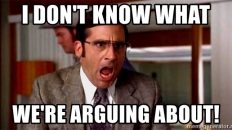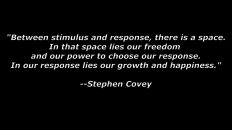00:01 okay welcome back
00:03 today we’re going to be talking about
00:04 anger the big scary topic that
00:06 everybody’s scared of
00:08 um anger is a very important emotion and
00:12 it’s one that
00:13 that often gets pushed away and side
00:15 talked and
00:16 and i don’t want to do that because it’s
00:18 it’s invaluable it’s really um
00:21 something not to be dismissed and so
00:24 this is probably going to be a several
00:25 video series over time
00:27 and today the way i want to start is by
00:29 talking about
00:31 the part of anger that i’m most familiar
00:32 with and that’s
00:34 denying it right there’s there’s a whole
00:36 subset of people and
00:38 this is to you that i’m talking to that
00:40 don’t
00:41 do anger don’t get angry very often
00:43 don’t have
00:44 access to their anger just no one would
00:48 ever call you an angry person
00:50 we will do other ones later on for
00:54 people who get really angry easily
00:56 and this isn’t that if that’s you uh
00:59 watch for some other things because this
01:01 might be valuable as well
01:03 but for right now i’m just going to talk
01:04 about anger and the people that
01:06 don’t go there very often
01:11 when i was in college i had some some
01:13 friends who would often say things like
01:15 tim i’m just kind of waiting for you to
01:17 start shooting people
01:19 tim i’m just kind of waiting for you to
01:21 explode
01:22 like there can’t this can’t be right you
01:24 can’t just never be angry it’s not right
01:27 and i didn’t get it i’m like no i’m just
01:30 i’m just not angry it’s just that that
01:32 doesn’t happen a lot for me and
01:33 sure it’s happened i don’t never get
01:35 angry but i’m just not an angry person
01:37 it’s fine
01:38 and i had always been taught that you
01:40 know seen commercials about going to
01:42 count to ten and never shake a baby and
01:44 like all of these things that are really
01:46 good advice
01:47 um but i think the thing that i learned
01:49 was anger is bad
01:51 and that was easy for me to do because i
01:52 didn’t get angry so so i became that guy
01:55 who never gets angry and is always happy
01:57 and peaceful and calm
01:58 and what i learned was that
02:02 it didn’t it didn’t work so well people
02:04 actually
02:05 stopped trusting me this is this is a
02:07 weird thing for me to get but
02:09 eventually i understood it if if you’ve
02:11 got the whole
02:12 range of human emotions here and
02:15 everybody feel
02:16 most people feel most things in this
02:18 range and anger is just like right there
02:19 in the middle
02:20 basically everybody gets mad and all of
02:23 my
02:24 friends experienced me having all of
02:27 these
02:28 except that one and and all of these
02:32 emotions
02:33 except the anger part right there and
02:35 what i realized that was that
02:38 there’s this big part of me that nobody
02:40 knew
02:41 and that’s kind of a little
02:44 untrustworthy
02:45 when you say to your friends you
02:47 actually know me
02:49 but you don’t know this part over here
02:50 and you’re never going to see it i’m
02:51 never going to show it to you
02:53 people can can actually distrust you a
02:56 bit because of that and that’s kind of
02:57 the feedback i was getting
02:59 what i learned over time was that anger
03:01 is actually a really
03:02 very useful emotion
03:06 this surprised me everybody had always
03:08 said anger was terrible
03:10 and now i started hearing from these
03:12 teachers that anger is actually
03:14 not only useful and okay to
03:18 feel but good
03:21 this may be a little weird to hear anger
03:23 can be
03:24 good because it’s it’s often the thing
03:28 that helps me realize my boundaries
03:30 and what i stand for and what i want
03:34 right the the for me the reason the way
03:36 anger shows up
03:37 in a positive light is if somebody comes
03:40 over and does something i don’t like
03:42 i get angry and and it’s not like hey
03:45 don’t come over
03:46 here because i’ll get angry and that’ll
03:48 be bad because i’m angry
03:49 no it’s it’s don’t come over here
03:51 because i don’t want you here
03:52 and if somebody crosses that boundary
03:55 i’m gonna get angry and that anger
03:58 helps me push back it helps it’s an
04:00 invigorating
04:02 emotion it enlivens us there’s a lot of
04:05 energy there’s a lot of power there
04:08 and all that power can be misused which
04:09 is why there’s always these bad
04:12 connotations about anger but it’s
04:15 a lot of life force that shows up
04:17 immediately to help you
04:19 as a tool to hold your ground
04:22 to hold your space to set your
04:24 boundaries to claim
04:26 your own sovereignty
04:29 and that may sound a little grandiose
04:31 but it’s not anger is actually a way
04:34 that i use as a tool to know this when i
04:37 feel angry
04:38 somebody has encroached upon me in a way
04:40 that i don’t like and i get to push back
04:42 against that that’s
04:43 okay one thing i’ve noticed in people
04:46 that
04:47 often don’t feel angry is that they also
04:49 often
04:51 don’t voice their preferences or claim
04:54 to not have opinions
04:55 or desires or wants or needs and i think
04:58 those go hand in hand
05:00 the more we repress our anger the more
05:02 we repress
05:04 our boundaries and our expression of the
05:06 things that we want
05:08 and so in this case for for me and for
05:10 this group of people for us
05:12 anger is good and i’m going to encourage
05:13 you to do it as much as you can
05:16 now obviously you want to let everybody
05:18 know in your life
05:19 hey i’m practicing anger it might be a
05:22 little sloppy it might be a little messy
05:23 i’d like your help
05:24 i’d like you to just let me know if i’ve
05:26 gone over the line
05:27 but yes go out and practice it and get
05:29 angry and express it and see what
05:31 happens because
05:33 my guess is you’ll feel a whole lot more
05:34 alive and
05:36 sure of yourself and confident it’s
05:38 wonderful
05:39 how do you do that for me this was a big
05:41 deal i had no idea even
05:43 how to get angry and so here’s here’s a
05:46 lesson that a teacher taught me that i
05:47 want to pass on
05:48 very useful number one get a journal
05:52 simple basic notebook um divide it into
05:54 two columns
05:55 and in one column write down the the
05:58 time
05:59 that something happened that you felt
06:01 angry about and then in the next column
06:03 um what you felt in your body
06:06 so i might write down uh 8 45 a.m
06:10 i got cut off in traffic and what i felt
06:12 in my body was my
06:13 hands tensing up or you know 3 30
06:18 my friend stood me up for lunch and what
06:19 i felt my body was uh
06:21 uh heat in here and so
06:25 this is actually really important is i
06:26 didn’t learn necessarily to feel
06:28 anger in the moment for a long time what
06:31 i did was kind of reverse engineer it
06:34 after writing all these down for for a
06:37 week
06:38 doesn’t even take very long uh you can
06:40 do it at the end of the day just reflect
06:41 back at the
06:42 for your whole day times when you think
06:44 you maybe have felt anger
06:46 don’t have to be right or wrong it’s
06:48 just a practice
06:50 but do this for a week or two and then
06:51 go back and look at it and what i
06:52 noticed was that there was a pattern
06:54 and the pattern for me was whenever i
06:56 feel
06:57 uh a tension in a clenching right here
07:00 in this spot i was angry
07:03 that was a pattern that i deduced and so
07:06 then
07:06 going forward is really easy for me to
07:08 feel attention here
07:10 a whole lot easier for me to feel that
07:12 than it was for me to feel the feeling
07:14 of anger
07:14 but when i felt that tension here i knew
07:17 i was angry
07:18 it’s like oh i must be angry let me feel
07:20 that and when i say let me feel that i
07:22 mean
07:23 there’s there is a a rush of of life
07:25 force and energy that kind of comes up
07:27 through me
07:28 and out and it i feel a little bit
07:30 bigger and i feel
07:32 warm and i feel uh a little jittery
07:35 and for me that’s that’s all i
07:38 necessarily need to do is is
07:39 let that move through me and
07:43 that’s it then i’m feeling the anger i
07:45 can decide whether to do something with
07:46 that if i want
07:47 yell at somebody kindly ask them not to
07:51 do whatever they’re doing
07:52 anything like that but the first step
07:56 really
07:56 is just noticing what it feels like to
07:59 be angry and
08:00 there will be a sensation in your body
08:03 there may be even
08:04 a few patterns but start writing all
08:06 that down every night and just
08:08 look for the pattern i would love to
08:10 know
08:11 how this goes please in the comments
08:13 below or send me an email
08:16 this is kind of near and dear to me
08:18 because i’ve worked really hard at it
08:19 and i’m still working hard at it
08:21 i’m definitely not good at anger yet
08:24 but let me know how this goes write down
08:26 that journal
08:28 start noticing some patterns let
08:30 everybody else who’s watching this
08:32 know too because there’s there is a
08:34 sense of community around this and like
08:35 oh yeah that happened to me too and all
08:37 right i didn’t notice that
08:39 that sometimes my legs get tense and i
08:41 hadn’t even thought about my legs
08:43 so please try this out and have a great
08:46 angry week
This is for those of you (us) who don’t get angry. For those pleasant people who never get their feathers ruffled, are always peaceful and kind, and who don’t ever get overwhelmed by their anger.
Stop it.
And I can say this because I’m one of you. I never got angry. I prided myself on it. Other people commented on it and praised me for it.
People trust anger
Then something strange started happening. Rather than praising it, people started questioning it. Friends began telling me that they were just waiting for me to snap and go postal. They were mostly joking… but not completely.
As I learned more, I realized that I wasn’t “never angry.” Instead, I was just hiding my anger. Hiding it from myself as much as from others. And people could feel this, they knew it. Put another way, people people I was close to knew that I was hiding something from them and they didn’t trust that. Suddenly, I went from being the most trustworthy person anyone knew to someone who was trustworthy, but not totally. Anger is something dead center in the bell curve of human emotions, and when people see you experience everything but anger, they begin to wonder if something is wrong. Yes, hiding your anger makes you untrustworthy.
Anger is good
But not getting angry is good, right? Not always. Not if you’re repressing it. Anger is like any other emotion, and you have a right, even a duty to yourself, to feel it. Not only that, anger can be good!
Anger is what helps us know our limits and hold our boundaries. Anger is a very enlivening, activating, powerful emotion. When someone crosses a boundary or does something I don’t like, I get angry. That anger isn’t a bad thing, it energizes me to push back against the transgression and claim my space. It helps me own my sovereignty. People who don’t embrace their anger often don’t express their opinions, desires, and needs, and are less their own person.
How to find it / feel it
Most people who have trouble feeling their anger don’t actually know when they’re angry. Here’s what to do:
- Get a journal or notebook and divide up a few pages into two columns
- Every you think you might be angry, write down what happened in one column and what you felt in your body in the other. E.g. “Got cut off in traffic – Hands clenched” or “Friend stood me up for lunch – Heat in my torso”. You can do this throughout the day or every evening, looking back at the day. Continue this for 1-2 weeks.
- Go back and read it. Look for patterns in your body reactions.
- Learn to recognize those bodily sensations in real time. Whenever you feel them, assume you are angry
- Look for the feeling of anger in your body. Start with the sensation you recognize and let it flow through you, expanding to the rest of your body.





Add comment